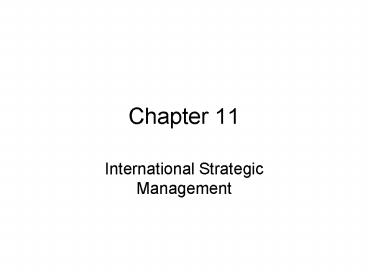International Strategic Management - PowerPoint PPT Presentation
1 / 11
Title:
International Strategic Management
Description:
What products/services will be sold? Where and how will ... to tailor to spec. ... No need to tailor to spec. markets. Four General International ... – PowerPoint PPT presentation
Number of Views:90
Avg rating:3.0/5.0
Title: International Strategic Management
1
Chapter 11
- International Strategic Management
2
Questions Asked in International Strategic
Planning
- What products/services will be sold?
- Where and how will they be produced?
- Where and how will they be sold?
- Where and how will inputs/resources be acquired?
- How will products/services be distributed?
- How can the company outperform competitors?
3
What Kinds of Competitive Advantages Can Firms
Gain by Doing Business Internationally?
- Global Efficiencies
- Cost reductions from global operations
- Locational Efficiencies where production costs
or distrib. costs are low - Economies of scale
- Plant specific
- Firm specific
- Economies of Scope
4
What Kinds of Competitive Advantages Can Firms
Gain by Doing Business Internationally?
- Multinational Flexibility
- Not limited in responding to political, economic,
legal, cultural changes in a country by making
changes in that country - Worldwide Learning
- Benefit from learning about techniques that have
been successful in various parts of the world - Attempts to achieve these competitive advantages
can conflict with eachother
5
Four General International Strategic Philosophies
- Home Replication Strategy
- Use firm specific advantage developed
domestically to expand internationally - No need to tailor to spec. markets
- No need to create a prod/service that serves
entire global marketplace - Global Strategy
- The world is a single marketplace
prods/services designed for worldwide market - Signif opportunities for scale econ in
prod/mkting - No need to tailor to spec. markets
6
Four General International Strategic Philosophies
- Multidomestic Strategy
- Firm views itself as a collection of independent
subsidiaries, each focusing on a specific
domestic market - Scale econ in prod/dist/mkting are low
- Clear diffs among national markets
- High coordination costs
- Transnational strategy
- Combination of global strategy and multidomestic
strategy - Scale econ are high in some aspect of bus. are
high - Need for local responsiveness
- Worldwide learning is the biggest advantage
7
Next Steps 4 Basic Components of Developing a
Strategy
- 1. Where are we going to gain a competitive
advantage? distinctive competence - 2. What markets will our operations encompass?
scope of operations - 3. Where will we distribute resources to serve
these markets? resource deployment - 4. How can we design a strategy so each
component of our business helps other components?
-- synergy
8
Specific Steps in Formulating an International
Strategy
- 1. Develop a mission statement
- Clarify, purpose, values, and direction
- 2. Perform a SWOT analysis
- Examine internal and external environments
- Internal
- Strengths
- What skills, resources, and/or other advantages
does our firm have relative to others - Weaknesses
- What shortcomings does our firm have that may
limit its competitiveness
9
Specific Steps in Formulating an International
Strategy
- 2. SWOT (continued)
- External
- Opportunities
- Threats
- 3. Develop Strategic Goals
- Use SWOT and Mission Statement to develop
measurable and realistic objectives for firm - 4. Tactics
- What methods will the firm use to reach these
goals? - 5. Control Framework
- Continually monitor progress in achieving goals,
change directions to meet these goals, and change
goals themselves
10
Levels of International Strategy
- Corporate Strategy entire firm
- Single Business Strategy
- Advantages
- Disadvantages
- Related Diversification Strategy
- Advantages
- Disadvantages
- Unrelated Diversification Strategy
- Advantages
- Disadvantages
11
Levels of International Strategy
- Business Strategy specific operating units or
strategic business units - Differentiation
- Cost leadership
- Focus
- Functional Strategy specific business functions
- Marketing, Human Resources, Research and
Development, etc.































